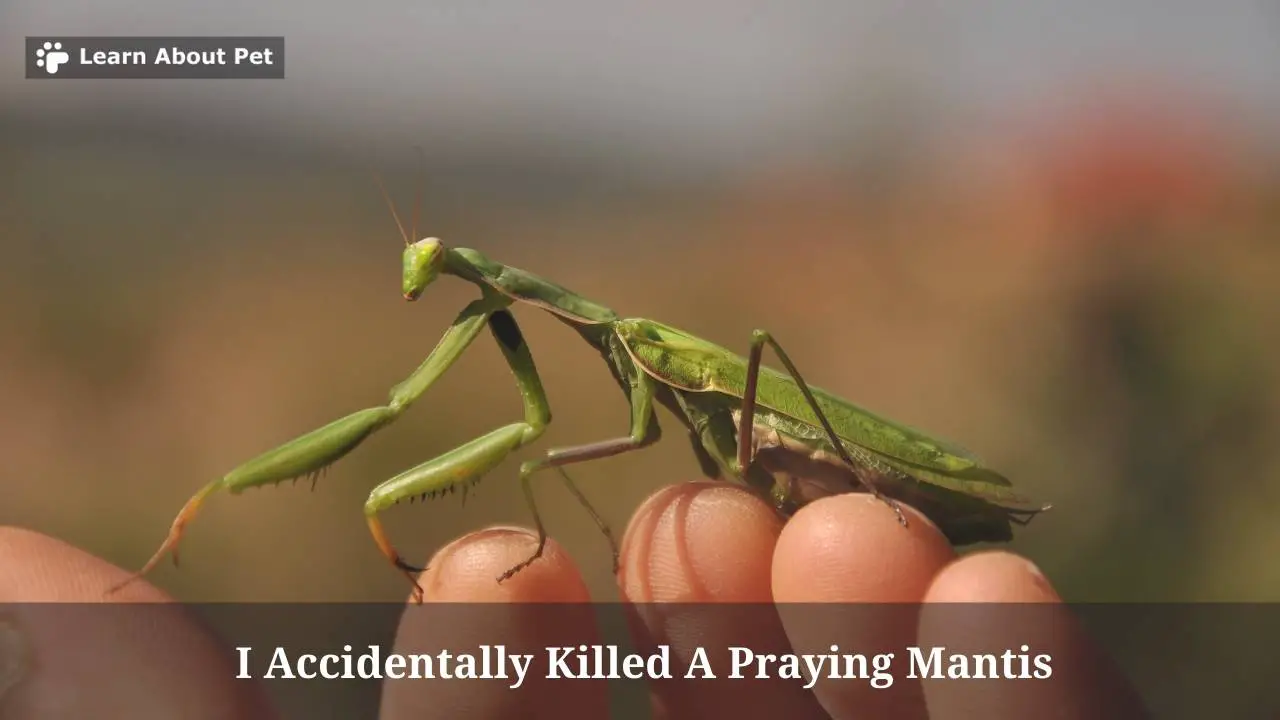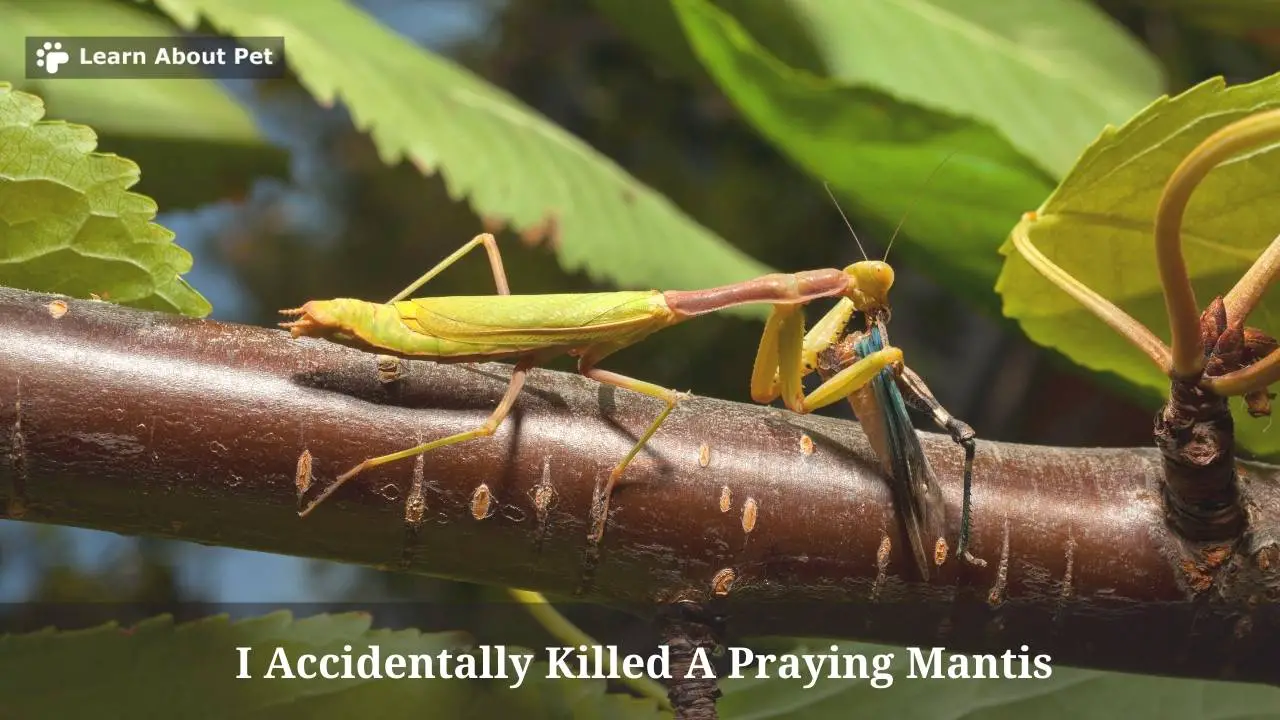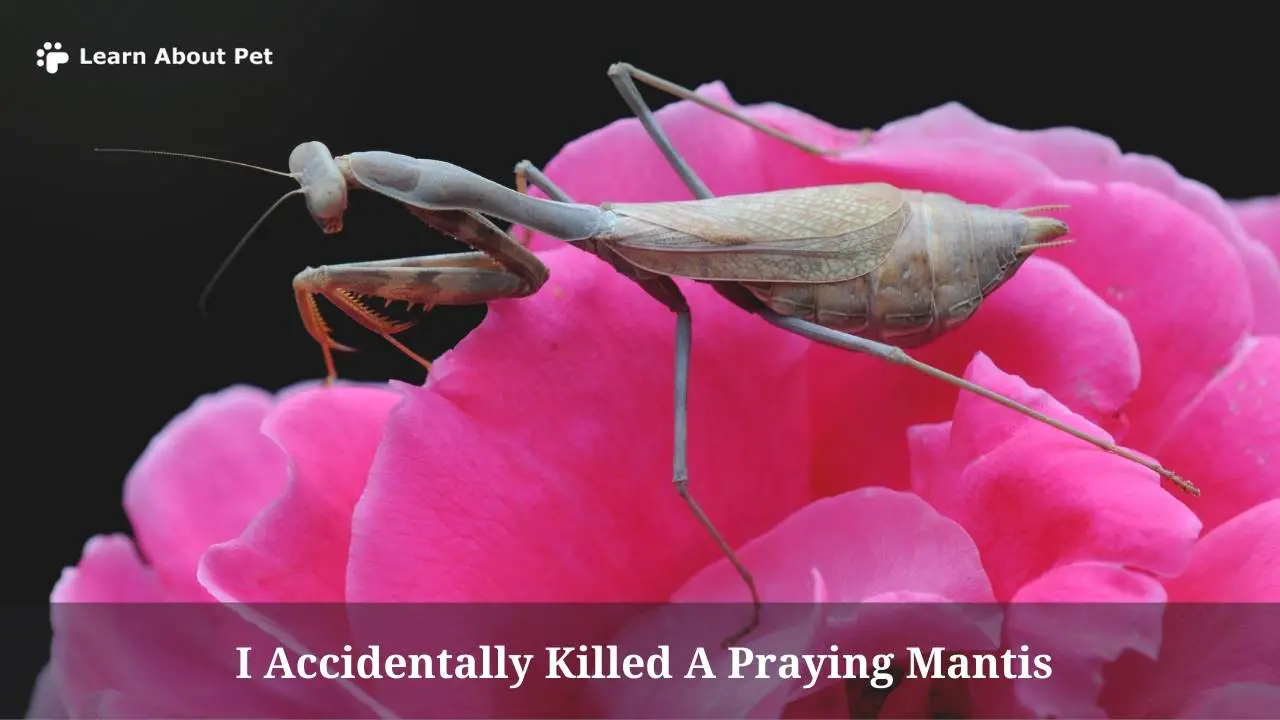Discovering that you have accidentally killed a praying mantis can leave you with many questions. You may want to know whether killing a praying mantis is illegal, what is likely to happen next, and what you need to do in the situation. This article has the answers.
If I accidentally killed a praying mantis, I would focus on trying to overcome the guilt, sorrow and grief I may be experiencing. While killing a praying mantis may not be illegal, it can nonetheless induce guilt and other negative emotions, especially if it was a treasured pet mantis.
But if the praying mantis’ killing was truly accidental, you need to console yourself with the fact that you didn’t do it intentionally.

How Can You Kill A Praying Mantis Accidentally?
In most cases, you kill a praying mantis accidentally when you (unintentionally) squash it: normally using your feet or hands.
Although a praying mantis is a fairly hardy insect, it can’t withstand squashing by a human. There if you unintentionally squash a mantis, it normally ends up dying.
While a mantis is lying on the ground, you may unknowingly walk on it. Then you end up killing it. So this becomes a case in which I accidentally stepped on a mantis, hence killing it.
Or you may move some heavy object onto a spot on which a praying mantis was lying. If the mantis doesn’t react in good time, it ends up having to bear the weight of the object. So it gets squashed, and dies.
Sometimes, you find that delivery guy killed a praying mantis accidentally in that sort of way…
There is also the scenario in which you may spray an insecticide that ends up killing a mantis accidentally. So the mantis licks the surface with the insecticide, and ends up dying.
In that sort of scenario, one may say that this mantis killed itself by licking the insecticide on its own volition. But deep down, you know that it is your action (of spraying the insecticide) that is the ultimate cause of the mantis’ death.
Is Killing A Praying Mantis Against The Law?
So far, we have looked at the exact ways in which one can end up killing a praying mantis accidentally.
The question that follows is on the legality of it. Is Killing a praying mantis illegal? And if yes, why is it illegal to kill a praying mantis?
One could even go further and ask, if it is illegal, what is the fine for killing a praying mantis?
The true position is that, in most parts of the world, killing a praying mantis is not illegal. The mantises are not protected by the law. So, for the most part, nobody will arrest you or fine you for killing a mantis accidentally.
That gives rise to other interesting questions: like, now that it is not illegal, is it ok to kill a praying mantis? Should I kill a mantis, since there are no legal consequences to it?
The truth of the matter is that you should avoid killing a praying mantis intentionally. Yes, it is not illegal. But it is still not right.
One may then want to know, why is it bad to kill a praying mantis (given that there are no legal consequences to it)? This indeed is quite an interesting question.
So, in all sincerity why is it bad to kill praying mantis? That is mainly because the praying mantis is an important part of the ecological system. Thus when you kill it, you remove a key cog in the ecological system.
So when thinking of why shouldn’t you kill a praying mantis, that is something to seriously consider.
Also think of it this way: can a praying mantis hurt you? The answer is mostly no. Then why go out of your way to kill it? Isn’t that barbarism?

I Accidentally Killed A Praying Mantis – What Is Likely To Happen?
What happens if u kill a praying mantis accidentally is that you may experience some guilt.
You may also have grief, especially if it is a pet mantis that you had bonded with.
As for the mantis itself, its body will start to decay. Antis and other scavenging insects may come and start feasting on it.
In the meantime, other mantis eggs somewhere may be hatching, to give rise to new mantises in order to take the place of the departed one. Life has to continue, somehow.
I Accidentally Killed A Praying Mantis Today – What To Do?
As noted earlier, the main feeling you may experience after killing a mantis accidentally is that of guilt.
So you need to work towards ‘counseling yourself’, and getting your subconscious to understand that the killing wasn’t intentional.
In more practical terms, what to do when your praying mantis dies may include burying it, and perhaps getting a replacement for it.
Final Verdict – I Accidentally Killed A Praying Mantis
It is quite easy to accidentally kill a praying mantis.
For instance, while walking, it is possible to end up accidentally squashing a mantis with your feet. You may also sometimes place heavy objects on a surface that a mantis was resting on, thus squashing it.
Yet another possibility is that of spraying an insecticide with some other objective – only for it to kill a mantis accidentally.
Although it may not be illegal to kill a mantis accidentally, it can nonetheless lead to feelings of guilt.

Thus if you accidentally killed a mantis, you should focus on overcoming the guilt.
If what you killed was a pet mantis, you may organize some sort of burial for it. Then you may consider getting a replacement, and putting in place measures to minimize chances of accidentally killing it.
As a pet lover, make sure to learn about pet more and give your pet mantis a good and comfortable life!

Welcome to Learn About Pet. My name is Rajkumar Ravichandran and I love all pets, travel, and amazing food. I write about my passion and personal experience caring for multiple pets in this blog! ❤️
Post Disclaimer
DISCLAIMER: THIS BLOG OR WEBSITE, "Learn About Pet", DOES NOT PROVIDE YOU WITH MEDICAL ADVICE AND IS NOT A SUBSTITUTE FOR MEDICAL ADVICE. ALWAYS GET IN TOUCH WITH YOUR PERSONAL VETERINARIAN AND USE INFORMATION HERE AS GENERAL ADVICE.
The information, including but not limited to, text, graphics, images and other material contained on this website are for informational purposes only. No material on this site is intended to be a substitute for professional veterinary advice, food recommendation, diagnosis, or treatment. Always seek the advice of your veterinarian or other qualified health care provider with any questions you may have regarding a medical condition or for pet food related questions.







